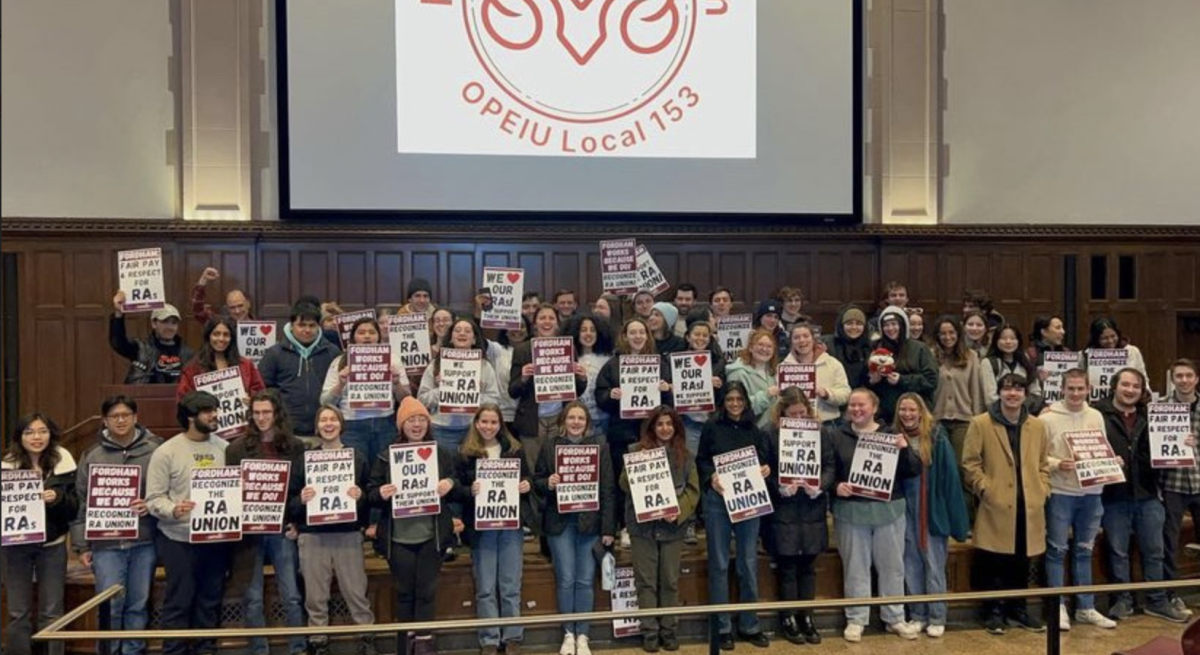Over the summer, negotiations stalled between the Fordham Resident Assistants Union (FRA) and Fordham University. This comes after the Resident Assistants (RAs) voted 47-19 to ratify FRA back in March of this year with the National Labor Relations Board (NLRB), which forced the university to recognize the union after refusing to in February.
“We started bargaining sessions in the middle of May since the University, by law, cannot ignore the election decisions. However, we had to stop after a bargaining session in June,” said Tarchithaa Chandra Sekharan, FCRH ’24, one of the six members of the FRA bargaining committee.
Chandra Sekharan explained that after their first bargaining session in May, Fordham refused to bargain hybridly, which would entail having the bargaining sessions online during the summer and in person during the school year.
“We filed a board charge against them. Most RAs are not on campus, and thus, bargaining only in person was not possible for us,” Chandra Sekharan said.
After Fordham agreed to bargain hybridly only when classes were not in session, the union dropped the labor charge against Fordham in return.
The bargaining then resumed late in August. Chandra Sekharan explained that Fordham has countered every aspect of the contract over language, but that is normal in the bargaining process.
The FRA represents the RAs in Fordham’s Rose Hill campus under the Office and Professional Employees International Union, Local 153 (OPEIU-153). FRA is one of three unions at Fordham that have taken recent action — including Fordham Faculty Union (FFU) and Graduate Student Workers Union (FGSW).
FRA originally petitioned for recognition in February of this year when their petition for voluntary recognition from the university was delivered to the president’s office on Feb. 1. On Feb. 7, President Tania Tetlow refused to recognize the union. After the ratification of FRA in March, the university was then forced to start the bargaining process.
“The University and the union are committed to negotiating in good faith to improve the working conditions for Resident Assistants in the bargaining unit. These workers are an important resource to the Fordham community, and their work provides a valuable aspect of their professional development,” said Bob Howe, associate vice president for communications.
Currently, FRA has introduced 10 proposals to Fordham, which were made available in one of FRA’s recent Instagram posts. The first five proposals were made at a previous bargaining session while the five most recent ones were proposed during the Aug. 22 bargaining session.
The first three proposals are that Fordham recognizes FRA, states the rights of the union — such as the right to be involved in settling grievances — and that they are given union access for a representative to meet with the union in the workplace.
The next two proposals are that the union will have shop stewards — members who will act as representatives who will have time during training for union orientation — and that Fordham must not discriminate against RAs for union involvement, marginalized identities and accommodations will be provided for RAs for reasons such as disabilities or religious beliefs.
The next three proposals state that if part of the contract is deemed illegal the rest will remain valid, terms of appointment are outlined with accommodations for RAs who require a different duration and that there will be a labor-management committee that is composed of five representatives from the union and university each that resolves problems.
The final two proposals present an official step-by-step process of warning and disciplining RAs and an official step-by-step process for an RA to present a grievance.
The next, and fifth, bargaining session is scheduled for Oct. 4.
Chandra Sekharan added: “A shout-out to the other unions on our Fordham campus (FFU and FGSW). Their support of us has been so monumental for us. We are also in solidarity with all other RA unions nationwide right now!”








































































































































































































